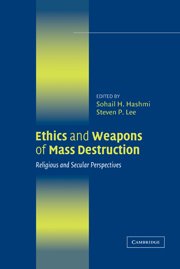Book contents
- Frontmatter
- Contents
- Tables and Figures
- Acknowledgments
- Abbreviations
- Ethics and Weapons of Mass Destruction
- Introduction
- 1 Weapons of Mass Destruction: A Brief Overview
- 2 The International Law Concerning Weapons of Mass Destruction
- PART ONE THE ORIGINAL DEBATE
- PART TWO EXPANDING THE CONVERSATION
- PART THREE CRITICAL PERSPECTIVES
- 21 A Feminist Ethical Perspective on Weapons of Mass Destruction
- 22 A Pragmatist Feminist Approach to the Ethics of Weapons of Mass Destruction
- 23 Pacifism and Weapons of Mass Destruction
- 24 Pacifism and Weapons of Mass Destruction: The Challenge of Peace
- 25 Weapons of Mass Destruction and the Limits of Moral Understanding: A Comparative Essay
- Contributors
- Index
23 - Pacifism and Weapons of Mass Destruction
Published online by Cambridge University Press: 05 June 2012
- Frontmatter
- Contents
- Tables and Figures
- Acknowledgments
- Abbreviations
- Ethics and Weapons of Mass Destruction
- Introduction
- 1 Weapons of Mass Destruction: A Brief Overview
- 2 The International Law Concerning Weapons of Mass Destruction
- PART ONE THE ORIGINAL DEBATE
- PART TWO EXPANDING THE CONVERSATION
- PART THREE CRITICAL PERSPECTIVES
- 21 A Feminist Ethical Perspective on Weapons of Mass Destruction
- 22 A Pragmatist Feminist Approach to the Ethics of Weapons of Mass Destruction
- 23 Pacifism and Weapons of Mass Destruction
- 24 Pacifism and Weapons of Mass Destruction: The Challenge of Peace
- 25 Weapons of Mass Destruction and the Limits of Moral Understanding: A Comparative Essay
- Contributors
- Index
Summary
Pacifism is opposition to war. As such, it is distinguished from nonviolence, since one might oppose war but think that violence is sometimes permissible. Nonetheless, earliest pacifism usually derives from explicit or implicit commitments to nonviolence. This is true of early Christianity, Buddhism, Jainism, Daoism, and the Hinduism espoused by Gandhi in his nonviolentist interpretation of the Bhagavad Gita. An exception is Mohism in ancient China, which is expressly pacifistic but does not espouse nonviolence.
Pacifism may be personal, principled, or pragmatic, depending on how it is grounded.
Personal pacifism is the refusal to participate in war as a personal commitment not considered binding on others.
Principled pacifism is opposition to war on religious, spiritual, and/or moral grounds considered valid for others as well.
Pragmatic pacifism is opposition to war on practical grounds, such as that it is an ineffective and inefficient way to pursue one's objectives.
Personal pacifists might agree with pragmatic pacifists that war is impractical and, like principled pacifists, take their renunciation of war to have a moral or religious character. It is just that they do not insist that others are required to make that same commitment (some conscientious objectors, for example, are willing to serve in the military so long as they are not expected to carry or use weapons). Personal commitment, rather than general beliefs about religion, morality, or practicality, is central to their pacifism. Principled pacifists, for their part, can also agree that war is ineffective. That is, they can secondarily be pragmatic pacifists as well.
- Type
- Chapter
- Information
- Ethics and Weapons of Mass DestructionReligious and Secular Perspectives, pp. 451 - 469Publisher: Cambridge University PressPrint publication year: 2004

